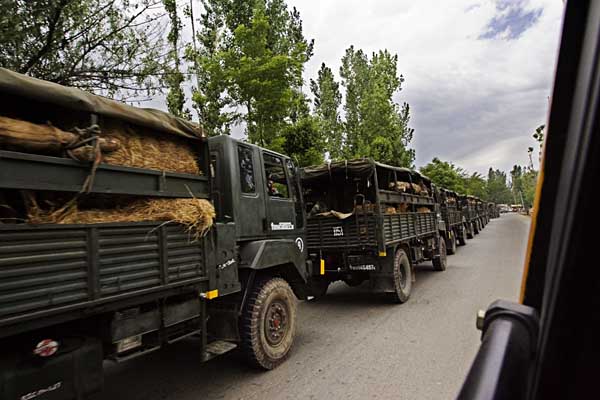Srinagar: Kashmiris want autonomy, better economic opportunities and removal of “overbearing presence of armed forces from their state”, a gathering of Kashmiri youth, activists and separatists said during an interaction here with young people from New Delhi.
Setting the stage for the discussion, students from Kashmir University and young professionals asked for the removal of the armed forces and “a commitment for dialogue” to secure their democratic rights.
“Laws such as the Armed Forces Special Powers Act (AFSPA) need to go. The militarised zone is meant to suppress Kashmiri people, not to secure the borders,” said Saba Khan, a human rights activist.
“We would like to see a clear road map towards demilitarisation and ensuring basic democratic rights for the youth of Kashmir,” she said.
“What security forces are securing is my sense of insecurity,” she added.

Also present at the discussion was Jammu and Kashmir Liberation Front leader Yasin Malik. He said the present generation of Kashmiris were conflict-borne children and were frustrated with the government. “And apart from political problem, it is a human problem.”
Criticising the killing of Kashmiri youth during the 2010 protests, Malik said: “The people’s movement turned into a non-violent movement in 2008 but even that has not been appreciated.”
“In the land of Mahatma, I could not find the soul of Gandhi,” he said.
The interaction was organised by the Centre for Policy Analysis, an organisation working in Kashmir. With AFSPA providing security forces immunity from prosecution, the participants spoke about incidents where the soldiers misused their immunity and harassed Kashmiri people.
“The lull in the valley you see at the moment is not peace,” said participant Faisal Qadri.
“Here, we are governed by a man who does not necessarily hold a matriculation certificate but has a gun,” he said.
He also said that youngsters who took part in stone pelting in 2010 were not drug addicts or paid by politicians.
“They were not terrorists. They were just suppressed youth who wanted to have the freedom to fulfill their aspirations.”
“Kashmiris have political aspirations as well as economic grievances. They have been persecuted both by New Delhi and our leaders,” said participant Junaid Matoo.
“Kashmiris want freedom to live a life of dignity which New Delhi has denied us. At present, the right to dissent, which should be our democratic right, is denied to us and our leaders have failed to institutionalise it,” he said.
Hamida Naeem, a teacher from Kashmir University, said that the consensus in the valley was not to be a part of India. Others too gave similar views.
“It is sad that the problems of Kashmir are never highlighted in the country’s media,” said editor of newspaper Rising Kashmir Shujat Bukhari.
Later, on queries of the Kashmiri participants, the visitors, who were students of Jawaharlal Nehru University, Delhi University and Jamia Millia Islamia and young professionals, said the focus should be on dialogue and creating common ground.
“Dialogue is very important. Conflict can never be an answer to political questions,” said lawyer Bajinder Singh.
The fight of other oppressed people across the country against social and economic inequalities can be a common ground for our friends from Kashmir,” said Jawaharlal Nehru University student Arjun.
“We need to create joint action and to put public pressure on the country’s political powers to address the violations of human rights and democratic rights in the valley,” he said.
The visitors agreed on the formation of a youth coordination committee to address issues such as demilitarisation, withdrawal of AFSPA, investigation into fake encounters, resumption of dialogue, restoration of the right to dissent, re-compensation for forced labour and environmental exploitation.
The opinions, beliefs and viewpoints expressed by authors, news service providers on this page do not necessarily reflect the opinions, beliefs and viewpoints of Hill Post. Any views or opinions are not intended to malign any religion, ethnic group, club, organization, company, or individual.
Hill Post makes no representations as to the accuracy or completeness of any information on this site page.



